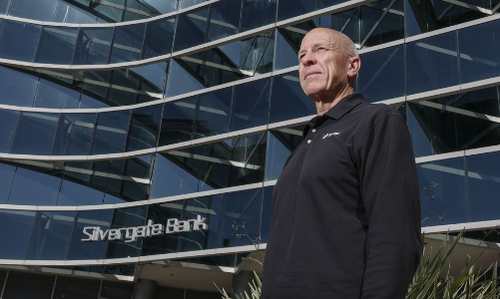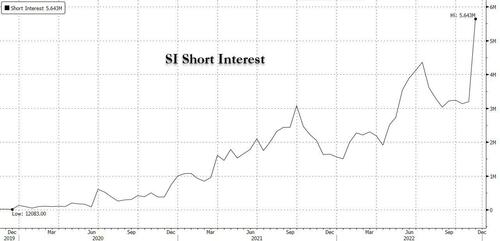
Throughout the FTX chaos, we have been closely watching the gyrations in Silvergate, a regulated US crypto bank: caught up in the collateral damage from FTX's implosion, Silvergate has plunged as low as $21 per share this morning, down from highs over $100 earlier this year and from record highs above $200 one year ago, as cash continues to pour out of the space.
The bank has now become a tug-of-war item between bears, who think the bank will get caught up in AML/KYC issues and/or that everything in crypto is heading much lower, and bulls, who see long-term value from a regulated bank when the "crypto winter" finally ends and the Fed pivots unleashing another massive liquidity gusher, sparking a scramble for non-printable fiat. The most recent punch landed has been by the bears when, this morning, NBC reported that Elizabeth Warren was "demanding answers" of the bank's relationship with FTX.
The letter to Silvergate said:
“In the weeks since FTX’s shocking collapse, new and disturbing allegations about the company’s business practices have continued to surface, including the reports that Mr. Bankman-Fried ‘secretly transferred some $10 billion of customer funds to his trading vehicle, Alameda Research,’ to fund ‘risky bets,’ violating both U.S. securities laws and FTX’s own terms of service. We are concerned about Silvergate’s role in these activities because of reports suggesting that Silvergate facilitated the transfer of FTX customer funds to Alameda.”
“Your bank’s involvement in the transfer of FTX customer funds to Alameda reveals what appears to be an egregious failure of your bank’s responsibility to monitor for and report suspicious financial activity carried out by its clients,” Warren wrote.
It is unclear if the bank didn't file suspicious activity reports - or if they were filed and simply ignored by relevant government agencies, as the CEO suggested previously. We're guessing Silvergate will clear this up in detail going forward.
“Silvergate appears to be at the center of the improper transfer of billions in FTX customer funds. Americans need answers. Those guilty of wrongdoing must be held accountable,” Warren continued.
She makes a great point. Those guilty of wrongdoing should be held accountable. So let's start with the man at the center of it all: why is Sam Bankman-Fried still walking around free?
But we digress. Throughout the last few weeks, Silvergate's CEO has been outspoken in communicating with the market to offer up its position on the controversy. Most recently, late on Monday - perhaps to preempt the NBC story - CEO Alan Lane released a public letter seeking to once again clarify, among other things, the bank's liquidity position and compliance standards.
"It has been a very difficult few weeks for the digital asset industry, as we have all come to terms with the apparent misuse of customer assets and other lapses of judgment by FTX and Alameda Research. There has also been plenty of speculation – and misinformation – being spread by short sellers and other opportunists trying to capitalize on market uncertainty," he wrote.
"I wanted to take this opportunity to set the record straight about Silvergate’s role in the digital asset ecosystem and what we have always done, and continue to do, to ensure our customers act in accordance with our robust risk management controls," he wrote.
He first tackled risk management and compliance:
We take risk management and compliance extremely seriously.
Silvergate operates in accordance with the Bank Secrecy Act and the USA PATRIOT Act. For each and every account, these laws require us to determine the beneficial owner, the source of funds, and the purpose and expected use of funds.
Silvergate also monitors transaction activity for every account and identifies activity outside of the expected usage. When we identify certain kinds of activity, we are required to file suspicious activity reports, and we do so routinely. We have a track record of closing accounts that are used for purposes outside of the expected use. This is no small undertaking. We have invested, and will continue to invest, in systems and procedures to help ensure we are conducting effective customer due diligence and monitoring. We have dedicated a substantial number of Silvergate employees to this effort.
And, as our customers can attest, the onboarding process can take weeks as a result of the time we spend gathering and reviewing information and documentation from prospective customers. After accounts are open, we continue to monitor account activity as part of our enhanced due diligence process on each of these accounts and to take action when there are red flags. By performing our risk management procedures and fulfilling our regulatory obligations, Silvergate plays a key role in helping law enforcement identify bad actors. We take this responsibility seriously.
Lane also commented on the company's due diligence on FTX and Alameda Research, stating that "...if we detect activity that is unexpected or potentially concerning in any account, we conduct an investigation and, when required, confidentially file a suspicious activity report in accordance with federal regulation."
Finally, he talked about the bank's "ample liquidity":
We have a resilient balance sheet and ample liquidity. While this has been a turbulent time in the digital asset industry, our customers’ deposits are, and have always been, safely held. In addition to the cash we carry on our balance sheet, our entire investment securities portfolio can be pledged for borrowings at the Federal Home Loan Bank, other financial institutions, and the Federal Reserve Discount Window – and can ultimately be sold should we need to generate liquidity to satisfy customer withdrawal request. We intentionally carry cash and securities in excess of our digital asset related deposit liabilities.
We purpose-built this business to support our customers not only during periods of growth but also in periods of volatility – that is, our business is designed to accommodate deposit inflows and outflows under a range of market conditions. I am eternally grateful to our employees for continuing to work hard in the face of so much uncertainty, and to our customers for their continued support. We look forward to continuing to provide a safe and reliable banking solution for the digital asset industry.
And while short sellers and skeptics continue to raise the risks of KYC/AML issues and float irrational ideas like "bankruptcy", not everybody has been skeptical of Silvergate. Certainly we continue to watch for opportunistic chances to own the bank's equity, as we believe during the next easing cycle, it will head back toward all time highs well over $200/share.
Recall, toward the end of November, "one of the richest men in crypto", Brendan Blumer, bought 9.3% of the bank. This makes him the largest shareholder of the bank. Additionally, his EOS development firm, Block.one, also owns a 7.5% stake in the bank. Combined he controls about 17% of the bank. Block.one put out a press release about their stake in the bank calling it a “proven track record of maintaining a liquid and conservative balance sheet investment portfolio.”

They all said: “We believe Silvergate’s current equity prices do not accurately reflect their strong balance sheet, their strategic positioning, or their market-defiant growth trajectory, and therefore offers a unique investment opportunity. We are excited to be a new passive shareholder."
The company is betting that when the smoke clears from the FTX pain, Silvergate will emerge not only little scathed, but potentially with its shares closely held, setting up potential for a swing higher in price again. On top of that, via Bloomberg, we saw late last month that Citadel has added 280,000 shares of the name and now holds 392k shares, or about 1.25% of the company.
However none of that matters right now, and instead shorts keep piling into SI stock, whose short interest is approaching a record 20% of the very illiquid float. That will likely continue until some catalyst short-circuits this feedback loop: it could include management giving a clear signal that the company is solvent (the CEO buying a substantial block of stock would certainly help), announces a sizable buyback, provides an early glimpse of its earnings and balance sheet, or unveils a deal with a strategic investor which locks up a sizable amount of the float, and potentially triggers a squeeze as signaled by the recent explosion in SI's short interest.
Throughout the FTX chaos, we have been closely watching the gyrations in Silvergate, a regulated US crypto bank: caught up in the collateral damage from FTX’s implosion, Silvergate has plunged as low as $21 per share this morning, down from highs over $100 earlier this year and from record highs above $200 one year ago, as cash continues to pour out of the space.
The bank has now become a tug-of-war item between bears, who think the bank will get caught up in AML/KYC issues and/or that everything in crypto is heading much lower, and bulls, who see long-term value from a regulated bank when the “crypto winter” finally ends and the Fed pivots unleashing another massive liquidity gusher, sparking a scramble for non-printable fiat. The most recent punch landed has been by the bears when, this morning, NBC reported that Elizabeth Warren was “demanding answers” of the bank’s relationship with FTX.
The letter to Silvergate said:
“In the weeks since FTX’s shocking collapse, new and disturbing allegations about the company’s business practices have continued to surface, including the reports that Mr. Bankman-Fried ‘secretly transferred some $10 billion of customer funds to his trading vehicle, Alameda Research,’ to fund ‘risky bets,’ violating both U.S. securities laws and FTX’s own terms of service. We are concerned about Silvergate’s role in these activities because of reports suggesting that Silvergate facilitated the transfer of FTX customer funds to Alameda.”
“Your bank’s involvement in the transfer of FTX customer funds to Alameda reveals what appears to be an egregious failure of your bank’s responsibility to monitor for and report suspicious financial activity carried out by its clients,” Warren wrote.
It is unclear if the bank didn’t file suspicious activity reports – or if they were filed and simply ignored by relevant government agencies, as the CEO suggested previously. We’re guessing Silvergate will clear this up in detail going forward.
“Silvergate appears to be at the center of the improper transfer of billions in FTX customer funds. Americans need answers. Those guilty of wrongdoing must be held accountable,” Warren continued.
She makes a great point. Those guilty of wrongdoing should be held accountable. So let’s start with the man at the center of it all: why is Sam Bankman-Fried still walking around free?
But we digress. Throughout the last few weeks, Silvergate’s CEO has been outspoken in communicating with the market to offer up its position on the controversy. Most recently, late on Monday – perhaps to preempt the NBC story – CEO Alan Lane released a public letter seeking to once again clarify, among other things, the bank’s liquidity position and compliance standards.
“It has been a very difficult few weeks for the digital asset industry, as we have all come to terms with the apparent misuse of customer assets and other lapses of judgment by FTX and Alameda Research. There has also been plenty of speculation – and misinformation – being spread by short sellers and other opportunists trying to capitalize on market uncertainty,” he wrote.
“I wanted to take this opportunity to set the record straight about Silvergate’s role in the digital asset ecosystem and what we have always done, and continue to do, to ensure our customers act in accordance with our robust risk management controls,” he wrote.
He first tackled risk management and compliance:
We take risk management and compliance extremely seriously.
Silvergate operates in accordance with the Bank Secrecy Act and the USA PATRIOT Act. For each and every account, these laws require us to determine the beneficial owner, the source of funds, and the purpose and expected use of funds.
Silvergate also monitors transaction activity for every account and identifies activity outside of the expected usage. When we identify certain kinds of activity, we are required to file suspicious activity reports, and we do so routinely. We have a track record of closing accounts that are used for purposes outside of the expected use. This is no small undertaking. We have invested, and will continue to invest, in systems and procedures to help ensure we are conducting effective customer due diligence and monitoring. We have dedicated a substantial number of Silvergate employees to this effort.
And, as our customers can attest, the onboarding process can take weeks as a result of the time we spend gathering and reviewing information and documentation from prospective customers. After accounts are open, we continue to monitor account activity as part of our enhanced due diligence process on each of these accounts and to take action when there are red flags. By performing our risk management procedures and fulfilling our regulatory obligations, Silvergate plays a key role in helping law enforcement identify bad actors. We take this responsibility seriously.
Lane also commented on the company’s due diligence on FTX and Alameda Research, stating that “…if we detect activity that is unexpected or potentially concerning in any account, we conduct an investigation and, when required, confidentially file a suspicious activity report in accordance with federal regulation.”
Finally, he talked about the bank’s “ample liquidity”:
We have a resilient balance sheet and ample liquidity. While this has been a turbulent time in the digital asset industry, our customers’ deposits are, and have always been, safely held. In addition to the cash we carry on our balance sheet, our entire investment securities portfolio can be pledged for borrowings at the Federal Home Loan Bank, other financial institutions, and the Federal Reserve Discount Window – and can ultimately be sold should we need to generate liquidity to satisfy customer withdrawal request. We intentionally carry cash and securities in excess of our digital asset related deposit liabilities.
We purpose-built this business to support our customers not only during periods of growth but also in periods of volatility – that is, our business is designed to accommodate deposit inflows and outflows under a range of market conditions. I am eternally grateful to our employees for continuing to work hard in the face of so much uncertainty, and to our customers for their continued support. We look forward to continuing to provide a safe and reliable banking solution for the digital asset industry.
And while short sellers and skeptics continue to raise the risks of KYC/AML issues and float irrational ideas like “bankruptcy”, not everybody has been skeptical of Silvergate. Certainly we continue to watch for opportunistic chances to own the bank’s equity, as we believe during the next easing cycle, it will head back toward all time highs well over $200/share.
Recall, toward the end of November, “one of the richest men in crypto”, Brendan Blumer, bought 9.3% of the bank. This makes him the largest shareholder of the bank. Additionally, his EOS development firm, Block.one, also owns a 7.5% stake in the bank. Combined he controls about 17% of the bank. Block.one put out a press release about their stake in the bank calling it a “proven track record of maintaining a liquid and conservative balance sheet investment portfolio.”

They all said: “We believe Silvergate’s current equity prices do not accurately reflect their strong balance sheet, their strategic positioning, or their market-defiant growth trajectory, and therefore offers a unique investment opportunity. We are excited to be a new passive shareholder.”
The company is betting that when the smoke clears from the FTX pain, Silvergate will emerge not only little scathed, but potentially with its shares closely held, setting up potential for a swing higher in price again. On top of that, via Bloomberg, we saw late last month that Citadel has added 280,000 shares of the name and now holds 392k shares, or about 1.25% of the company.
However none of that matters right now, and instead shorts keep piling into SI stock, whose short interest is approaching a record 20% of the very illiquid float. That will likely continue until some catalyst short-circuits this feedback loop: it could include management giving a clear signal that the company is solvent (the CEO buying a substantial block of stock would certainly help), announces a sizable buyback, provides an early glimpse of its earnings and balance sheet, or unveils a deal with a strategic investor which locks up a sizable amount of the float, and potentially triggers a squeeze as signaled by the recent explosion in SI’s short interest.







